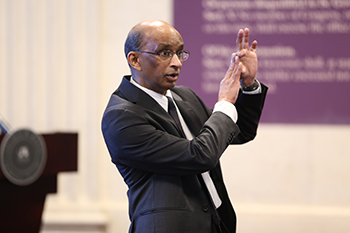With artificial intelligence and blockchain poised to transform the health care industry, a conference at the Kline Institute of Trial Advocacy on March 22 hosted by the Health Law program explored the legal and regulatory implications of these developments.
Artificial intelligence poses tremendous opportunities and challenges, said Nicholas Terry, the Hall Render Professor of Law and executive director of the Hall Center for Law and Health at Indiana University Robert H. McKinney School of Law, during the keynote.
“In the U.S., health care has proven immune to technology-based disruptions,” Terry said. “Artificial intelligence is likely to change that.”
Robots may one day do everything from scheduling appointments and checking-in patients to maintaining clinical records, making diagnoses informed by algorithms and image pattern recognition, and even performing surgery, Terry said.
Artificial intelligence will increase productivity and become a critical addition to teams making diagnoses, pointing to the potential that standards of care may begin to require its implementation, Terry added.
The prospect of regulating AI in the health care world is complicated for a host of reasons, including the interactive nature of device-professional relationships that differ dramatically from the licensing of care providers, and the difficulty of pinpointing how algorithms reached specific conclusions, Terry explained.
“The medical device regulatory model is an out-of-date touchstone,” he said. “These questions are about intertwining of humans and devices in ways we haven’t seen before.”
Any effective regulatory scheme will be sensitive to machine-human relationships, universal rather than domain-specific and devised before AI assumes a central role in primary care, Terry added.
 Professor Murugan Anandarajan of Drexel's LeBow College of Business tallied the benefits of using blockchain to create an immutable and secure ledger of transactions from payments to patient record transfers. Blockchain removes the need for third parties to handle transactions, making them more efficient, more secure and transparent to every party involved in a ledger, Anandarajan said.
Professor Murugan Anandarajan of Drexel's LeBow College of Business tallied the benefits of using blockchain to create an immutable and secure ledger of transactions from payments to patient record transfers. Blockchain removes the need for third parties to handle transactions, making them more efficient, more secure and transparent to every party involved in a ledger, Anandarajan said.
Blockchain – which can operate in private or public networks – can promote transparency and efficiencies in the supply chain, he added, noting that the technology could inform a diner who caught the tuna on his plate and how long it was in the freezer.
A panel featuring attorneys Jamie Petenko and Sara Goldstein, ’11, of BakerHostetler and attorney Jennifer Zegel of Kleinbard, moderated by Professor Hannah Bloch-Wehba, explored the implications of blockchain for patient privacy, security and safety.
Several features of blockchain are squarely in conflict with principles of the General Data Protection Regulation, which affects all organizations that provide services to individuals within the EU, Petenko said, adding that countries such as Brazil, Japan, Mexico and Singapore are moving to implement similar rules. Among the conflicts, Petenko explained, is the fact that blockchain creates a permanent record, while GDPR requires that records be correctable or capable of deletion.
 The secure nature of blockchain makes it appealing to health care providers, Goldstein said, since it’s not subject to data breaches, which states are investigating with increasing aggressiveness. At the same time, she said, companies are embracing blockchain without seeing the big picture and recognizing the ways that an immutable ledger could affect litigation strategy.
The secure nature of blockchain makes it appealing to health care providers, Goldstein said, since it’s not subject to data breaches, which states are investigating with increasing aggressiveness. At the same time, she said, companies are embracing blockchain without seeing the big picture and recognizing the ways that an immutable ledger could affect litigation strategy.
Blockchain will create efficiencies by eliminating silos that prevent different providers from accessing a patient’s records, Zegel said, noting that it will take time for patients to understand and trust it. In addition, she said, blockchain can form the basis for smart contracts that do not require a third party to implement or step in to resolve disputes.
A panel exploring the uses of blockchain in health care settings was moderated by Kim Upshaw, Esq., the corporate health care compliance and privacy officer for TridentUSA Health Services and the author of numerous academic and white papers on HIPAA privacy rule implementation strategies.
 Beverly Prohaska, an IT consultant, said blockchain has tremendous potential for clinical trials and that pharmaceutical companies are already formulating strategies for creating audit trails that will support this process. It will speed the rollout of new drugs and enhance the quality of clinical trials, by permitting companies to screen patients more effectively.
Beverly Prohaska, an IT consultant, said blockchain has tremendous potential for clinical trials and that pharmaceutical companies are already formulating strategies for creating audit trails that will support this process. It will speed the rollout of new drugs and enhance the quality of clinical trials, by permitting companies to screen patients more effectively.
Andrew Bull, ’16, the founder and CEO of Bull Blockchain LLC, is part of a consortium seeking a grant from the EU to explore the potential for state and federal legislation that would address concerns about blockchain in the context of GDPR or similar regulations. In the meantime, Bull said blockchain offers a much more efficient model for managing supply chains, reimbursements and securely transferring information across databases. Patients can be compensated for sharing information and allowed to opt-in or out, giving them greater control over their information, Bull said.
“Our information has been manipulated and sold without our knowledge,” he said. “This technology provides an additional layer of transparency.”